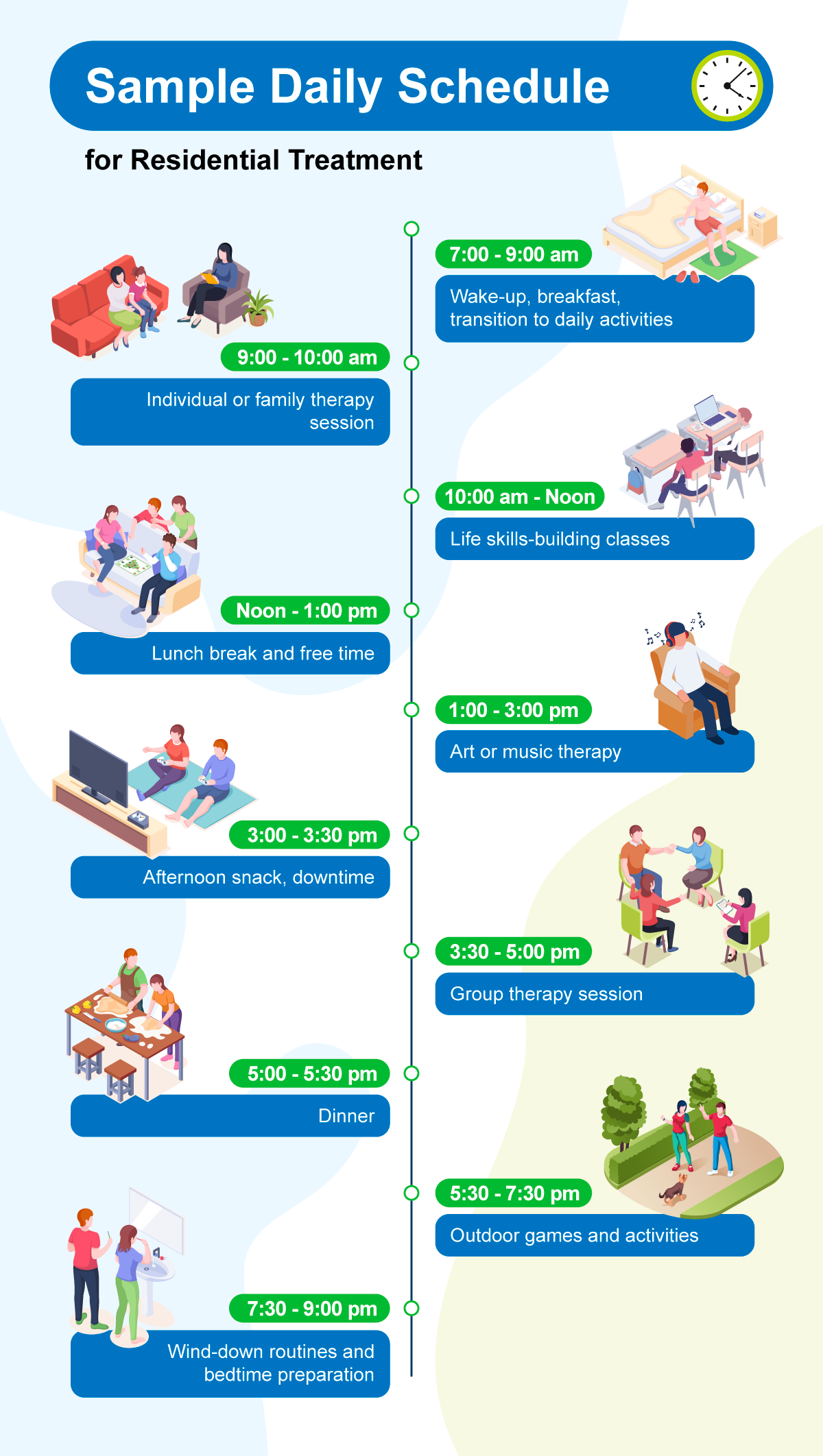Parenting is never simple, even under the best circumstances. But seeing a child struggle with serious mental health challenges can feel overwhelming. When a once-happy kid is suddenly withdrawn, sad, or hopeless, parents often ask themselves: What happened? Where do we turn for help?
Teen depression varies in severity, so treatment options range. While some teens respond well to talk therapy or an intensive outpatient program (IOP), others need a higher level of care. In these cases, residential treatment for teen depression may be the best path forward. Residential programs provide a structured, long-term therapeutic environment where adolescents receive intensive support to stabilize, learn coping skills, and begin healing.
Getting the right care now makes a tremendous difference. For many families, that means exploring teen mental health services like those offered by HillsidesCares in Los Angeles County.
HillsidesCares is special among Los Angeles residential treatment programs. Unlike many centers that focus on dual diagnoses involving depression and substance use, we exclusively treat adolescents with mental health needs but not substance use disorders. If this description fits your teen, call us at 323-641-4842 to learn how our adolescent residential treatment program can help.
What is residential treatment for teen depression?
Residential treatment for teen depression is an intensive, structured program that offers 24/7 support for adolescents facing serious challenges. At HillsidesCares, teens have a safe, nurturing environment to heal at their own pace. Individualized treatment plans may include a combination of the following therapies:
Individual therapy
One-on-one sessions with a licensed therapist help teens build self-awareness, practice emotional regulation, and explore core issues. Approaches may include Cognitive Behavioral Therapy (CBT), Dialectical Behavior Therapy (DBT), trauma therapy, exposure therapy, and other therapies, depending on the teen’s needs.
Group therapy
In a supportive, peer-based setting, group therapy provides a safe space for teens to share experiences and build resilience together. Sessions foster peer support, strengthen social skills, and encourage connection during the recovery process.
Family therapy
Because healing happens at home as well, family therapy sessions bring parents and teens together to improve communication, build trust, and create healthier patterns of interaction.
Psychiatric care & medication management
When appropriate, teens have access to psychiatric evaluations and ongoing medication management. Following residential care, we offer virtual psychiatric care to make treatment consistent and accessible.
Health education & experiential activities
Proper nutrition supports mental health. Meal planning and nutrition education teach teens how balanced eating can improve mood, energy, and overall wellness. Outdoor activities take advantage of the Southern California climate to encourage movement, confidence, and new perspectives on healing.
Mind-body practices & alternative therapies
Yoga, meditation, and mindfulness exercises empower teens with stress management techniques and tools for distress tolerance they can use long after treatment. Evidence-based alternative therapies like art and music therapy provide expressive outlets for processing emotions.
Personalized care is the cornerstone of our adolescent residential treatment in Los Angeles.
How do I know if my teen needs residential treatment for depression?
A teen who feels unusually down or sad because of a recent event or difficult circumstance is not necessarily suffering from depression. The same is true if they have started spending less time with family, or are periodically moody and irritable. These are normal parts of being a teenager.
However, if your teen is unable to cope with daily life, or is experiencing several of the symptoms listed below, residential treatment is an excellent place for them to heal and grow.
Signs your teen may need inpatient help
Depression looks different in every teen, but common warning signs include:
- Persistent sadness or irritability
- Loss of interest in favorite activities
- Noticeable changes in sleep or appetite
- Low energy and trouble focusing
- Declining grades or refusal to attend school
- Feelings of hopelessness or worthlessness
While any one of these signs might be temporary, a cluster of ongoing symptoms is cause for concern. If your teen’s mental health seems to be declining despite your support, it may be time to consider inpatient depression treatment as the next step toward healing.
What are the benefits of a residential program vs. outpatient treatment?
Outpatient programs let teens stay with their family every night and participate in school at least part of the time. But for teens struggling with suicidal ideation, self-harm, or severe depression, intensive treatment in residential therapy is often a better choice.
Residential therapy provides around-the-clock professional clinical support, a structured environment, and room to heal away from everyday life stressors. They can make friends with peers who understand what they are experiencing and develop social skills that benefit them immediately, when they return home, and throughout their life.
Why choose our residential program in Los Angeles?
Every teen experiences depression differently, which is why HillsidesCares never takes a one-size-fits-all approach. In our residential program, each teen receives an individualized treatment plan created by a dedicated care team that may include psychiatrists, nurses, behavior specialists, crisis response staff, case managers, and licensed mental health clinicians.
This collaborative team works closely with parents and teens to support lasting healing. Unlike many inpatient programs in Los Angeles, HillsidesCares specializes in depression-only treatment. If your teen is not struggling with substance use, they can focus on recovery in a program designed specifically for their mental health needs.
Get Help for Your Teen Today
How can I support my teen during their stay?
At HillsidesCares in Pasadena, we know that teens with depression don’t live in isolation. Family involvement is an essential part of treatment. Parents are strongly encouraged to visit, take part in family therapy, and learn strategies to support their teen’s recovery.
In these sessions, a therapist helps guide open communication while family members share thoughts, repair strained relationships, and build healthier ways of connecting. Families also gain tools to better understand their teen’s treatment experience, recognize triggers, and provide ongoing support once their teen returns home.
“Suicide is the third leading cause of death among LA youth.”
What sets mental-health-only programs apart
Many advances in teen mental health treatment programs have come through dual-diagnosis care, which treats both addiction and mental health issues together. But not all teens struggling with depression also face substance use problems. These adolescents need a treatment space tailored to their actual needs.
In a mental-health-only program, the focus stays on depression treatment and related concerns such as self-harm or suicidal thoughts. Unlike mixed programs, therapy groups here are not centered on substance use recovery, allowing teens to receive care that truly reflects their experiences.
Are there teen mental health programs in Los Angeles that don’t treat addiction?
Yes. At HillsidesCares, we provide residential depression treatment programs in Los Angeles County specifically for teens who are not battling addiction. Here, adolescents benefit from peer support with others who share similar struggles. While dual-diagnosis care is crucial for those facing both depression and substance use, our specialized program ensures the focus remains on mental health treatment for depression alone.
What can I expect from the HillsidesCares teen depression program?
In Los Angeles County, about one-third of teens experience depression, and suicide remains the third leading cause of death among local youth. The need for effective teen depression treatment is urgent.
HillsidesCares provides intensive residential care that combines individual therapy, small group sessions, and family therapy to create a balanced, supportive environment. Teens also receive medication management when appropriate and learn coping skills to manage tough emotions and build resilience. Experiential therapies such as art, meditation, and music therapy round out the program, giving teens paths to grow and thrive.
Importantly, our commitment doesn’t end when residential care concludes. We partner with parents and family members to design personalized aftercare plans, helping teens reintegrate into daily life and continue using the tools they’ve developed. This ensures that the progress made in our safe, structured setting carries forward into lasting recovery.
What does a day in residential mental health treatment look like?

How to get started with residential treatment in LA
Depression is a serious mental health issue, but help is available. At HillsidesCares, we meet teens and families with compassion, empathy, and evidence-based treatment strategies that build coping skills and support lasting healing. As a parent, you don’t need to have all the answers. Sometimes the best step is turning to professional, structured care in a safe and supportive environment, giving your teen the chance to move beyond depression and toward thriving.
Don’t wait to seek help. Support is here for your teen and your entire family. Contact HillsidesCares online or call us at 323-641-4842. With the right resources and the care of our community, hope and healing are possible.

